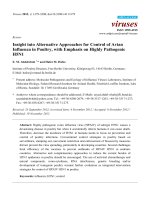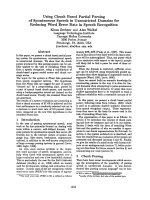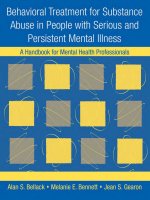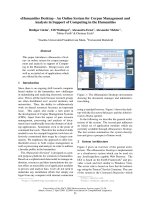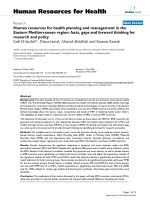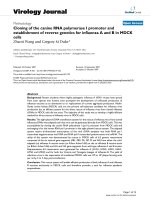07 11 K Nhiem Nutritional interventions for reducing morbidity and mortality in people with HIV
Bạn đang xem bản rút gọn của tài liệu. Xem và tải ngay bản đầy đủ của tài liệu tại đây (309.03 KB, 11 trang )
Nutritional interventions for reducing
morbidity and mortality
in people with HIV
Clinical
www.cochranejournalclub.com
Clinical questions
• Do macronutrient supplements, given to provide energy,
protein or both; or a specific macronutrient (such as amino
acids, whey protein or Spirulina) help HIV+ people live longer
and more healthy lives?
• Should HIV+ people be following a specific eating plan (for
example a high energy/protein diet enriched with Spirulina) in
order to stay healthy and live longer?
Source: Grobler L, Siegfried N, Visser ME, Mahlungulu SSN, Volmink J. Nutritional interventions for
reducing morbidity and mortality in people with HIV. Cochrane Database of Systematic Reviews 2013,
Issue 2. Art. No.: CD004536. DOI:10.1002/14651858.CD004536.pub3.
www.cochranejournalclub.com
2
Context
• Adequate nutrition is important for optimal immune and
metabolic function.
• HIV+ people who are untreated (i.e. not receiving
antiretroviral therapy (ART)) or treated (i.e. receiving some
form of ART) are at risk of nutritional disorders. Furthermore,
HIV infection is most prevalent in parts of the world where
food security is compromised.
• Achieving and maintaining optimal nutrition is an important
adjunct in the clinical care of HIV+ people, as good nutrition
can improve an individual’s immune function, limit diseasespecific complications, and improve quality of life and survival.
www.cochranejournalclub.com
3
Methods
• Eligible studies were sought using CENTRAL, MEDLINE, EMBASE,
LILACS, and Gateway. Reference lists of articles were checked
and authors of relevant studies and other relevant researchers
were contacted for additional information.
• Standard estimates of risk ratio (RR) and 95% confidence
intervals (CI) were calculated for dichotomous outcomes. Mean
differences (MD) and 95% CI were estimated for continuous
outcomes.
• Similar studies were combined if it was clinically meaningful to
do so, with the random effects model using for meta-analyses.
www.cochranejournalclub.com
4
PICO(S) to assess eligible studies
• Participants: Adults and children with HIV/AIDS, excluding
HIV+ pregnant women. People with TB/HIV co-infection were
included if their randomisation had been stratified by HIV
infection status.
• Intervention: Dietary interventions to provide additional
protein, energy or both, and interventions providing 1g or
more of a specific macronutrient element. Interventions had
to be oral and given for 4 weeks or longer.
• Comparison: Usual diet, dietary counselling or placebo.
• Primary outcomes: All-cause mortality, mortality related to
HIV infection and other HIV-related conditions and morbidity.
• Studies: Randomized trials.
www.cochranejournalclub.com
Description of eligible studies
• 14 trials (1725 adults, 271 children) in the out-patient setting,
differing in stage of HIV, treatment status and nutrient status.
• 7 studies were from high-income countries: USA (4),
Switzerland (2) and Germany (1); 4 studies from Africa (South
Africa, Kenya, Burkina Faso and Central African Republic), 1
from Brazil and 1 from India. Location is unclear for the other.
• Each trial evaluated a different supplement, apart from 2 (1 in
adults, and 1 in children) of Spirulina.
• 3 trials reported mortality. Other outcomes included body
weight and composition, viral load, CD4 count, energy intake
and quality of life.
• No trials were graded as providing strong evidence.
www.cochranejournalclub.com
Results - Mortality
• Only 3 trials reported on deaths (2 in adults, 1 in
children).
• Supplementary food (1 trial) and daily supplement of
Spirulina (1 trial) did not significantly alter the risk of
death compared with no supplement or placebo in
malnourished, ART naive adults.
• A nutritional supplement enhanced with protein did
not significantly alter the risk of death in HIV+ children
with prolonged diarrhoea , compared to standard
nutritional care (1 trial).
www.cochranejournalclub.com
7
Results – Other outcomes
• Supplementation with macronutrient formulas to provide
protein, energy or both and fortified with micronutrients, in
conjunction with nutrition counselling, significantly improved
energy intake (3 trials; n=131; MD 394 kcal/day; 95% CI: 225 to
562; p<0.00001) and protein intake (2 trials; n=81; MD 23.5
g/day; 95% CI: 12.7 to 34.0; p<0.00001) compared with no
nutritional supplementation or nutrition counselling alone in
adults with weight loss.
• In general, supplementation with specific macronutrients such
as amino acids, whey protein concentration or Spirulina did not
significantly alter clinical, anthropometric or immunological
outcomes in HIV-infected adults and children.
www.cochranejournalclub.com
8
Conclusions for practice
• In keeping with WHO recommendations, everything possible
should be done to promote and support adequate dietary
intake and food security, while recognising that this may not be
sufficient to correct specific deficiencies in all HIV-infected
individuals.
• There is low quality evidence that provision of a balanced
macronutrient supplement, fortified with micronutrients,
increases the daily energy and protein intake when compared
to nutritional counselling alone.
• The choice of supplement is likely to be determined by cost and
availability.
www.cochranejournalclub.com
9
Conclusions for research
• Adequately powered studies are needed to determine the
efficacy, safety and cost-effectiveness of macronutrient
supplements in HIV+ adults and children.
• Choice of supplements for future research should be guided by
the evidence-base and focus on determining the optimal
composition and dosage of balanced macronutrient
supplements fortified with micronutrients, and fortified food
supplementation delivered by food programmes.
• Research participants should be diverse with respect to stage of
disease, use of antiretroviral therapy, immune status, and
nutritional status.
www.cochranejournalclub.com
10
Useful links
• Cochrane Journal Club discussion points
• Nutritional interventions for reducing
morbidity and mortality in people with
HIV
www.cochranejournalclub.com

